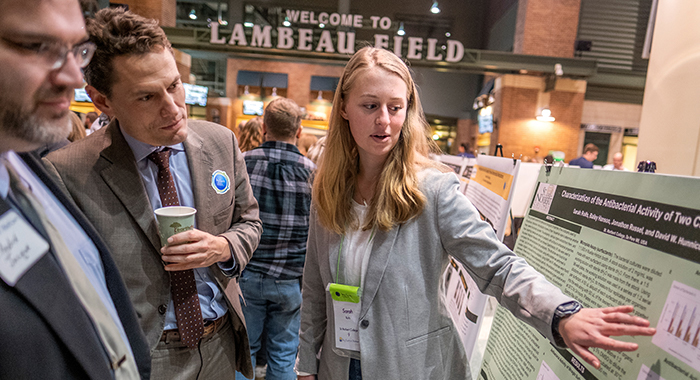Tiny Earth, Frozen Tundra Sets Earth Scientists Digging Deeper
Students in a microbiology class got a chance to share their research findings with an attentive audience at the recent Tiny Earth in Titletown symposium in the Lambeau Field atrium.
Hosted by the University of Wisconsin-Madison’s state Institute for Discovery, Tiny Earth is a network of instructors and students focused on sourcing antibiotic discovery from soil. In the weeks leading to the December event, students, led by David Hunnicutt (Biology), gathered soil samples from throughout the Green Bay area and screened them to see if any produced antibiotics – and some did. Students then shared their findings at the symposium.
“It gave them a chance to see their work in context to what other people are doing,” Hunnicutt says of the Tiny Earth experience. “They got to talk to other students to see what they are working on and to talk about how things might fit together. Putting them on a bigger stage gave them an opportunity to think of themselves as scientists, not just students.”
Claire Stevens ’20 was excited to participate.
“The event was a great experience to not only learn about microbiology, but also provided an opportunity for students to understand what scientific conferences are like and how they function,” she says. “Also, I am currently applying for graduate school and other research positions and knowing the Tiny Earth ‘protocol’ has proved very beneficial in these applications, particularly when applying to microbial ecology labs.”
Hunnicutt said that, based on student enthusiasm, he’d like to participate in future Tiny Earth events.
Launched in 2018, the innovative Tiny Earth program centers on an introductory biology course, during which students perform hands-on field and laboratory research with the goal of finding new antibiotics. Today, nearly 10,000 students in 45 states and 15 countries are enrolled in some version of the course annually. The program is meant to inspire and retain students in science while addressing one of the most pressing global challenges of this century: the diminishing supply of effective antibiotics.
The Tiny Earth in Titletown event was developed by biology instructors and administrators at the University of Wisconsin-Green Bay and Northeast Wisconsin Technical College to showcase the innovative science, research and teaching taking place in northeast Wisconsin. Other participating colleges included the College of the Menominee Nation, Marian University, University of Wisconsin-Fond du Lac, Milwaukee Area Technical College, University of Wisconsin-Parkside, University of Wisconsin-Waukesha County, University of Wisconsin-Whitewater, University of Wisconsin-Rock County, Madison College, University of Wisconsin-Madison, Northcentral Technical College and University of Wisconsin-River Falls.
Area scientists judged student submissions.
“It was a great opportunity for students to take ownership of the class,” Hunnicutt says. “I had one student come in over Thanksgiving break to work on her project. Seeing students catch the bug of what being a scientist is all about was great.”
Feb. 4, 2020












